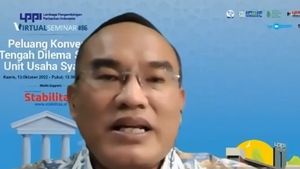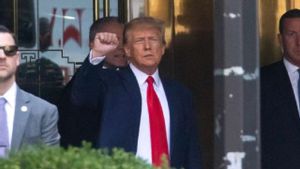YOGYAKARTA – The principles of Islamic economics have a number of differences with the principles applied in the economy in general.
Sharia economics is based on religion, in this case, Islam.
Everything related to economic activities must be based on the values that have been regulated in Islam. For more details, the following summary is taken from various sources.
Definition and Principles of Sharia Economics
Quoted from stekom.ac.id, an economic expert, Monzer Kahf explained that Islamic economics is part of economics that is interdisciplinary or cannot stand alone so it requires in-depth mastery, especially in the science that supports it.
The notion of Islamic economics is also explained by M.A Mannan who says that Islamic economics is a science that studies people's economic problems inspired by Islamic values.
Although based on Islamic values, Islamic economics is not only aimed exclusively at the Muslim community.
In the Basic Values and Principles of Sharia Economics issued by the Department of Sharia Economics and Finance of Bank Indonesia, it is explained that Islamic economic and financial values are intended for all levels and groups of society.
In the pkebs.feb.ugm.ac.id site, Luthfi Nurlita Handayani explained that in general the principles of Islamic economics are based on five universal values, all of which are rooted in Islamic teachings. The five principles include monotheism (faith), 'adl (justice), nubuwwah (prophecy), khilafah (government), and ma'ad (results).
The five universal values act like a foundation that determines the strength of a building or an economic system. The details are as follows.
-
Tauhid
Tawhid is defined as faith, that is, everything that is done in the world will be held accountable to God in this case Allah S.W.T in the hereafter. Islamic economics must be based on the basis of faith.
-
‘Adl
'Adl is defined as justice. That is, Allah commands humans to be fair and not to do injustice to others just to seek personal gain.
-
Nubuwwah
Nubuwah is the element of prophethood. In sharia economic activities, it must be carried out with the provision of the character and attitude of the prophet who is an example, especially for Muslims.
-
Khilafah
The Khilafah is defined as a government that is authorized to have a role to ensure that distortion does not occur so that the economy can run properly.
-
Ma’ad
Defined as a result. In the sharia economy, the results or profits obtained by the community do not only apply in the world but are expected to be good results for the hereafter.
Implementation of Sharia Economics
Bank Indonesia (BI) and the Indonesian Ulema Council (MUI) have formulated several principles that form the foundation of Islamic economics, namely as follows.
- Control of individual assets to flow towards investment so that economic activity continues to grow.
- Distribution of income to ensure inclusiveness of the entire community through certain rules and mechanisms to ensure people's purchasing power.
- Optimizing investment (buying and selling) and various risks without usury because the existence of usury will actually cause injustice because it transfers losses to the borrower.
- Financial transactions are closely related to the real sector, prohibiting unproductive speculation, No Maysir or avoiding elements of gambling (gambling).
- Social participation for the public interest is carried out through infaq, alms, and waqf. All three are able to increase public resources and keep economic activities running.
- Muamalah transactions are based on fair, transparent cooperation, do not endanger safety, are not unjust, and do not contain illegal substances.
VOIR éGALEMENT:
That is information related to Islamic economic principles. For other interesting information, visit VOI.ID.
The English, Chinese, Japanese, Arabic, and French versions are automatically generated by the AI. So there may still be inaccuracies in translating, please always see Indonesian as our main language. (system supported by DigitalSiber.id)











